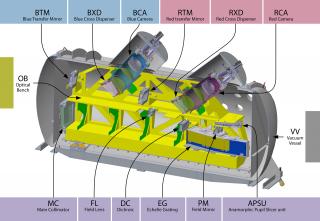Bibcode
Montes, D.; González-Peinado, R.; Tabernero, H. M.; Caballero, J. A.; Marfil, E.; Alonso-Floriano, F. J.; Cortés-Contreras, M.; González Hernández, J. I.; Klutsch, A.; Moreno-Jódar, C.
Bibliographical reference
Monthly Notices of the Royal Astronomical Society, Volume 479, Issue 1, p.1332-1382
Advertised on:
9
2018
Citations
75
Refereed citations
60
Description
We investigated almost 500 stars distributed among 193 binary or
multiple systems made of late-F, G-, or early-K-primaries and late-K- or
M-dwarf companion candidates. For all of them, we compiled or measured
coordinates, J-band magnitudes, spectral types, distances, and proper
motions. With these data, we established a sample of 192 physically
bound systems. In parallel, we carried out observations with
HERMES/Mercator and obtained high-resolution spectra for the 192
primaries and five secondaries. We used these spectra and the automatic
STEPAR code for deriving precise stellar atmospheric parameters:
Teff, log g, ξ, and chemical abundances for 13 atomic
species, including [Fe/H]. After computing Galactocentric space
velocities for all the primary stars, we performed a kinematic analysis
and classified them in different Galactic populations and stellar
kinematic groups of very different ages, which match our own metallicity
determinations and isochronal age estimations. In particular, we
identified three systems in the halo and 33 systems in the young Local
Association, Ursa Major and Castor moving groups, and IC 2391 and Hyades
superclusters. We finally studied the exoplanet-metallicity relation in
our 193 primaries and made a list 13 M-dwarf companions with very high
metallicity that can be the targets of new dedicated exoplanet surveys.
All in all, our dataset will be of great help for future works on the
accurate determination of metallicity of M dwarfs.
Related projects

ARES: High Spectral Resolution
ARES (High Spectral Resolution) is a coordinated project which attempt to join and consolidate the efforts on instrument developments at high spectral resolution within the IAC. The goal is to launch the scientific programs that the IAC carries out on the search and characterization of exoplanets, in particular Earth-like exoplanets, on the
Jonay Isai
González Hernández